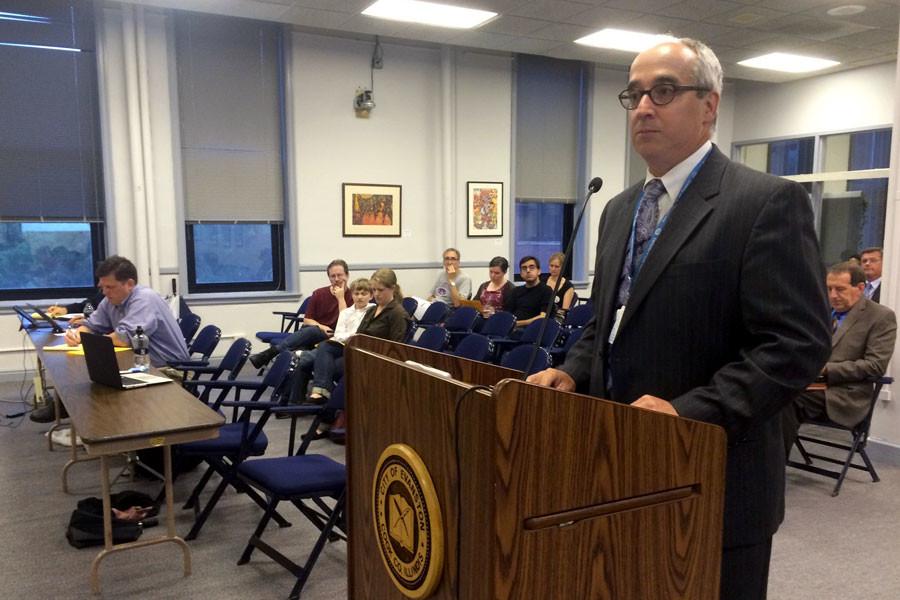Evanston staff funding uncertain without fuel tax revenue
Julia Jacobs/Daily Senior Staffer
Marty Lyons, Evanston’s chief financial officer, speaks at a City Council meeting. Lyons said the Illinois government has withheld fuel tax revenue from the city since July 1, when the state began its own fiscal year without a budget.
November 3, 2015
Evanston officials must find alternative funding to pay Public Works Agency staff for 2016 if Illinois fails to pass its own budget by January.
During the state’s four months without a budget, it has not paid Evanston revenue from the motor fuel tax, which is partially used to fund salaries for public works staff, chief financial officer Marty Lyons said. Although the public works salaries this year remain safe, the source of next year’s funding is in question as long as the state remains without a budget, he said.
However, even if the state manages to pass a budget, it is possible funds from the motor fuel tax — which is 19 cents per gallon — will continue to be withheld to balance the state’s debt.
“We just don’t know,” Lyons said. “(The state) has floated out so many things — from property tax freezes to keeping a part of the shared income tax.”
About one-third of the anticipated revenue from the motor fuel tax — amounting to $833,000 — was allocated to fund public work staff salaries, according to the city’s proposed 2016 budget. The rest of the revenue, about 1.5 million, would go to street maintenance. But if Evanston does not receive the tax revenue in January, City Council will have to amend the 2016 budget to allocate funding for the salaries, Lyons said.
The city’s budget is scheduled for adoption on Nov. 23.
In other Illinois communities, officials must either find alternative funding for road reconstruction projects or put them on hold entirely, said Mike Walczak, transportation director for the Northwest Municipal Conference. But this specific funding freeze isn’t new: Last March, motor fuel tax revenue was withheld to help balance the state’s 2015 budget, Walczak said.
“There are some fears that could happen again,” he said.
A bill was introduced to the Illinois House at the end of August to provide communities with motor fuel tax revenue from July to September. The bill, which authorized $146 million in payments, was never brought to a vote.
Without a 2016 budget in place, the state has been functioning under a series of alternative means such as court-mandated payments from the state and funds from the state budgeted for a long-term period. As of mid-October, the state had a debt pile of nearly $7 million, Illinois Comptroller Leslie Munger announced last month.
Since July, the state has also withheld federal funding for the Chicago Metropolitan Agency for Planning, the official regional planning organization for transportation and land use in northeastern Illinois. If CMAP remains without funds, the agency will be forced to close at the end of the month, putting new capital projects in jeopardy, Walczak said.
If CMAP were to shut its doors, Evanston would lose a valuable resource for connecting the city with grants and providing it with information through transportation studies, Lyons said.
“We would have to fend for ourselves,” Lyons said. “We would lose those resources — the people who help us go after grants, tell us which doors to go through.”
Email: juliajacobs2018@u.northwestern.edu
Twitter: @juliarebeccaj


